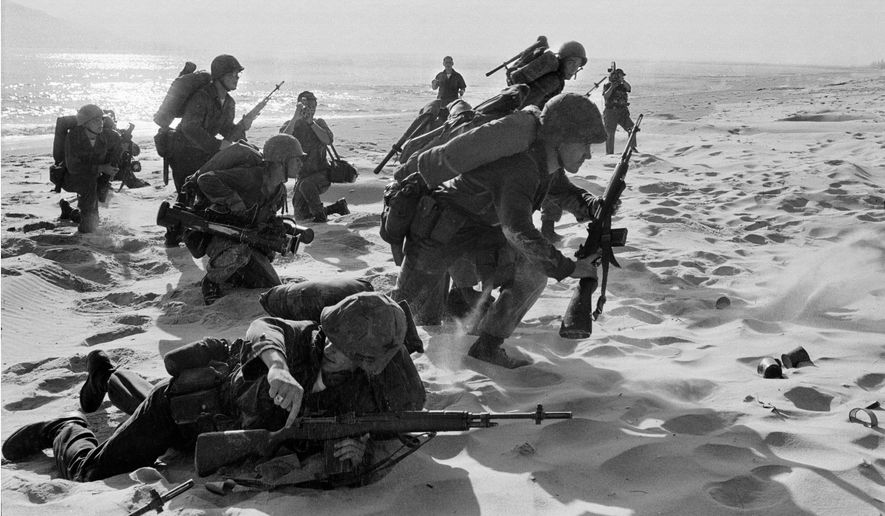ROCHESTER, Minn. (AP) - As a special forces commander during the Vietnam war, Bill Fritts of Byron ran recon and civil affairs missions in and around South Vietnam for 32 months. But it wasn’t until two decades later, when the war had long been over, that Mr. Fritts realized it wasn’t over for him.
He began having horrible dreams.
He would awaken at night drenched in sweat. Mr. Fritts had a recurring dream in which his men were “running operations” in some jungle-laden locale. It would dawn on Mr. Fritts, as the dreams continued, that the men in them were dead now. “I’m the only guy still alive.”
Then one night Mr. Fritts woke up in his Byron home, and there, sitting at the end of his bed, was a North Vietnamese Army lieutenant, smoking a cigarette and smiling. As soon as Mr. Fritts would sit up, the Vietnamese man vanished.
A doctor later diagnosed Mr. Fritts’ case as the worst Vietnam-related Post Traumatic Stress Disorder he had ever seen.
It’s been five decades since Mr. Fritts, now 79, served in the Vietnam War as a Green Beret special forces commander, running small-group missions, moving stealthily through the jungle, wearing the black pajamas that allowed him to blend into his surroundings.
Yet his experiences echo a reality that other area veterans who were interviewed for this 50-year retrospective on the Vietnam war attest to. The Vietnam War may have slipped into the annals of history, but for those who served, it never completely ended.
Richard Daly, an IBM employee and Vietnam veteran, says the reality of today’s surviving Vietnam war veterans can be summed up in a line he once heard.
“Somebody asked this guy, when were you in Vietnam? His answer was, last night,” he told the Post-Bulletin.
Today, Mr. Fritts runs a 120-cattle ranch outside of Byron. The dreams don’t torment him as much as they used to, although he knows he will never be completely free of them. Yet, he gains a measure of peace and healing being around his cattle, which he affectionately refers to as “my troops.”
Despite the dreams and his 100 percent disability rating, largely as a result of his exposure to Agent Orange, Mr. Fritts expresses no regrets about his service.
What he does take issue with are the popular versions of the Vietnam War. Today Vietnam is passed down as tragedy, a military adventure rooted in a misguided Cold War containment theory that cost the lives of thousands of Americans.
But it didn’t have to be that way, he says. The United States could have won.
“We were doing everything they wanted us to do — and then some. We had the damn thing won in ’68,” Mr. Fritts said, referring to a turning point in the war, the Tet Offensive, that turned out to be a battlefield victory for American forces but played out as a strategic defeat at home. “They didn’t pursue it, and they didn’t pursue it because of politics.”
Today, the legacy and meaning of Vietnam remains very much in dispute, even among area veterans. Some see it as a tragic mistake. Others see it as a historical crossroads that could have had a different outcome. Some wished they had never gone to Vietnam, given what they saw and experienced and did. Many are proud of their service, although they were glad to leave Vietnam when they did.
Most were in their early to mid-20s when they served and fought. Today those veterans are in their early to mid-60s or older, approaching or having passed retirement age.
There are 10,205 veterans in Olmsted County, with Vietnam vets accounting for about 80 percent of benefits and entitlements handled through the local veterans service office, said Neil Doyle, supervisor of the Olmsted County Veterans Services office.
U.S. involvement in the Vietnam War was a step-by-step escalation. The conflict’s evolutionary nature has given rise to debate as to the precise date of its start.
But one thing is not in dispute. Over time, from 1950 through 1965, the U.S. went from an advice-and-support role to a direct combat role. By the summer of 1965, America was all in, irrevocably committed to fighting in Southeast Asia. In February of that year, the Post-Bulletin reported its first casualty from the Rochester area. More than 2.7 million American personnel served.
Vietnam was different from any previous conflict fought by the U.S. It was the first televised war, the first to beam images of combat to American living rooms. Unlike previous conflicts, from the Civil War to the Korean conflict, progress was measured by body counts, not by territory won and lost.
But there is one indisputable way in which the Vietnam legacy reverberates to this day, say veterans and veterans advocates: The public’s mood toward the Vietnam war soured as the conflict dragged on, and returning veterans became the scapegoats. They were derided and spat upon, scorned as baby killers.
Because of this, when veterans from Iraq and Afghanistan - two wars that also divided the public — began returning, it was Vietnam veterans who were at the forefront welcoming them home. Never again would they allow other veterans to be treated as they had been treated.
“They came home quietly. They shoved their medals in the closet and they went to school and they started businesses. It wasn’t until the recent Iraq, Afghanistan wars that they kind of started coming out of the woodwork to lobby for veterans rights,” Mr. Doyle said.




Please read our comment policy before commenting.